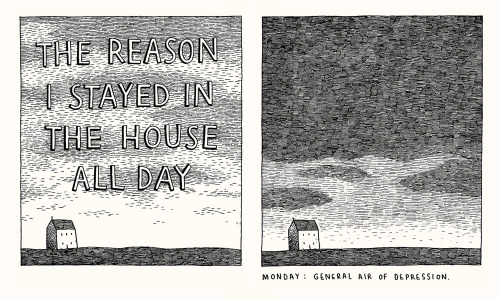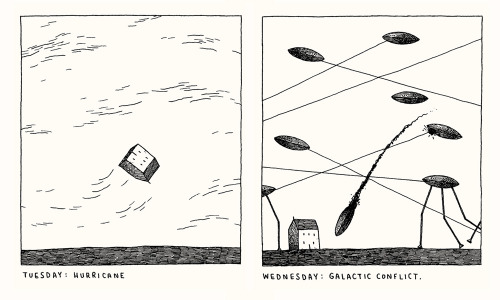Latest Posts by psyxe - Page 6
I FOUND IT GUYS I SPENT HALF AN HOUR LOOKING FOR THIS VIDEO AND ITS HERE
I’d really like structural critiques to move away from using words like “scum” in general. Individualist moralizing doesn’t belong in discussion of systemic forces; in fact, the two are directly at odds. And it’s a mindfuck of a double-bind for people who are prone to taking ideas seriously: “this issue is very large and touches many aspects of society, and you personally are directly responsible for it.” Structural problems will not be solved by obsessively purifying your own heart.
i think the weirdest thing about the shelter-in-place has been the nightly howl, which i forget about every night until i’m walking my dog and the neighbors just suddenly start fucking howling.
some of you are like “if a homemade cloth mask isn’t 100% EFFECTIVE AT PREVENTING DISEASE it’s worth LESS THAN NOTHING and you might as well go around licking doorknobs and DIE than cover your face AT ALL for ANY REASON”
look okay coughing or sneezing into your elbow isn’t 100% effective at stopping fluid particles from being dispersed into the air or on surfaces but even a measley 5-10% reduction in spewed particles is better than 0%
An Astronaut’s Tips For Living in Confined Spaces
One thing astronauts have to be good at: living in confined spaces for long periods of time.

Nearly 20 years successfully living on the International Space Station and more than 50 flying in space did not happen by accident. Our astronauts and psychologists have examined what human behaviors create a healthy culture for living and working remotely in small groups. They narrowed it to five general skills and defined the associated behaviors for each skill.
For many of us in a similar scenario, here are the skills as shared by astronaut Anne McClain:
Skill 1, Communication

Share information and feelings freely.
Talk about your intentions before taking action.
Discuss when your or others’ actions were not as expected.
Take time to debrief after success or conflict.
Admit when you are wrong.
Skill 2, Self-Care

Balance work, rest, and personal time. Be organized.
Realistically assess your own strengths and weaknesses, and their influence on the group.
Identify personal tendencies and their influence on your success or failure. Learn from mistakes.
Be open about your weaknesses and feelings.
Take action to mitigate your own stress or negativity (don’t pass it on to the group).
Skill 3, Team Care

Demonstrate patience and respect. Encourage others.
Monitor your team (or friends and family) for signs of stress or fatigue.
Encourage participation in team (or virtual) activities.
Volunteer for the unpleasant tasks. Offer and accept help.
Share credit; take the blame.
Skill 4, Group Living

Cooperate rather than compete.
Actively cultivate group culture (use each individual’s culture to build the whole).
Respect roles, responsibilities and workload.
Take accountability; give praise freely. Then work to ensure a positive team attitude.
Keep calm in conflict.
Skill 5, Leadership/Followership

Accept responsibility.
Adjust your style to your environment.
Assign tasks and set goals.
Lead by example. Give direction, information, feedback, coaching and encouragement.
Talk when something isn’t right. Ask questions.
We are all in this together on this spaceship we call Earth! These five skills are just reminders to help cultivate good mental and physical health while we all adjust to being indoors. Take care of yourself and dive deeper into these skills HERE.
Make sure to follow us on Tumblr for your regular dose of space: http://nasa.tumblr.com.





A cartoon I drew in about 2003.
p.s. stay safe, and if you’re ordering lockdown reading, consider ordering it from your local comic shop or bookshop if you can.
p.p.s. I have a new book out soon: https://www.tomgauld.com/comic-books-v2
she walked into my office uninvited, and I gotta say it was a relief to have a client that wasn’t a vampire for a change.

Fireflies











“I stayed at work for you. You stay at home for us.”


Happy Birthday Chester. We miss you. ❤️ Feel free to post your favorite happy / funny / inspiring memory of Chester below.
The simple fact is that in retrospect whatever we do WILL have been either an under- or an overreaction. Either we don’t do enough and it becomes an absolute disaster, or we do just enough, it doesn’t become an absolute disaster, and everyone goes “haha why was everyone panicking? Why did I have to stay at home?” It’s like the Y2K bug, after nothing bad happened it was seen as an absolute joke, but the only reason why nothing happened is that a lot of smart people spent a lot of time and money fixing it. If we social-distance and self-isolate properly and make this go away, it WILL be seen as a joke and an overreaction in the future. That’s fine, that’s the best possible outcome.

Miss this dear soul so much










𝘩𝘢𝘱𝘱𝘺 𝘣𝘪𝘳𝘵𝘩𝘥𝘢𝘺 𝘤𝘩𝘢𝘻𝘺 𝘤𝘩𝘢𝘻! (𝘮𝘢𝘳𝘤𝘩 𝟸𝟶𝘵𝘩, 𝟷𝟿𝟽𝟼)❤️🎂

crazy story which I have done no justice to by reading the transcript instead of listening to it, thus missing the entire point of hearing the song they’re talking about.
ultisols said: wxke af
broke: woke
woke: wxke
hey what if we didn’t combine dozens of unrelated political positions into two color-coded options
dude shows up in a Tesla Roadster™ so to one up him you show up in a Tesla Semi™, who’s the bigger dick now

christ
Here’s a post about Hard Problem of Consciousness, since @argumate and @foolishmeowing have talking about it lately:
I think it’s a mistake to view the Hard Problem as unique to materialism. Idealism can’t answer it either, and generally doesn’t try to. IMO, the problem is not really about matter, but about description or explanation.
(I also don’t think it’s unique to “formal” systems or approaches, except in a sense so broad that any philosophy that could ever be done is “formal,” because it involves strings of words and/or arguments.)
The Hard Problem is very similar to the problem of existence – “why is there something rather than nothing?” Both of these are questions about what “animates” or “turns on” any given description – what makes a description (such as a formal system) more than “mere words on a page.” This is a distinctive class of problem because any familiar kind of explanation would simply become part of the description, and thereby be subject to the exact same problem.
If you add some sort of “existence-maker” mechanism to your description of what exists, you’re still open to the objection that the entire description, existence-maker and all, could just as well be an inert logical structure, without the extra magic of existence. This is a pretty familiar, standard point in the context of the existence question, but in discussions about consciousness, the analogous point tends to get buried under arguments about whether or not there is more of a problem for certain kinds of description – “material” or “formal” or “functional” ones, or whatever.
It seems to me that this is a problem for descriptions, period. If you look at the various dualistic and idealistic systems that have been proposed, they tend to be, well … systems: descriptive accounts of what is supposed to exist (some or all of it mental/spiritual), along with some arguments about why we should assent to the description, but nothing inherent in them to light the flame and turn these descriptions necessarily into the realities they talk about. These systems do claim that the flame is in fact lit, but they generally treat this as self-evident via Descartes’ cogito or similar. At least one mind/spirit exists (by cogito), and here are some things it can conclude a priori about other existents – Leibniz’s various principles, McTaggart’s theory of determining correspondences, or whatever – and we’re off to the races.
These can be perfectly fine theories of what mind/spirit is, insofar as it exists, but they simply do not touch why/how it exists: you need the spark of a cogito to get things started, and the cogito doesn’t leave you any less in the dark about why there’s an existing mind (instead of there not being one). It just convinces you that there is one. And once you’ve decided to work within a frame where that is taken as given, you’ve given up on Hard Problems. These theories only “explain” the ineluctable experiencey-ness of experience in the way that the observation “as a matter of fact, something exists” explains why there is something rather than nothing – which is to say, not at all.
It seems intuitively clear to me that these Hard Problems are unanswerable, because they ask for something that is incompatible with what we take to constitute an “answer” to a question. They ask for an argument that some description is necessarily animated, that there’s no mystery about how it becomes more than words on a page because there is something impossible about the merely-words version of it. But such an argument is either:
(1) An argument for purely logical necessity, i.e. necessity within the terms of the description, in which case the necessity property is just one more fact about the description and could be as “mere” as the rest, or
(2) An argument that the description gets necessarily lit up by the animating fire of something else that already has it, in which case we need some initial spark to start things up, one that is not explained within the terms of the description. Generally this spark is supposed to be “obvious” / a priori, but the fact that we have a priori knowledge of something doesn’t constitute an explanation of why we have that knowledge, so this doesn’t get the job done.








Love, Death & Robots — Fish Night
Mathematician. Leader. Heroine. Remembering Hidden Figure Katherine Johnson
Tonight, count the stars and remember a trailblazer.

We’re saddened by the passing of celebrated #HiddenFigures mathematician Katherine Johnson. She passed away at 101 years old.

An America hero, Johnson’s legacy of excellence broke down racial and social barriers while helping get our space agency off the ground.

Once a “human computer”, she famously calculated the flight trajectory for Alan Shepard, the first American in space.

And when we began to use electronic computers for calculations, astronaut John Glenn said that he’d trust the computers only after Johnson personally checked the math.

As a girl, Katherine Johnson counted everything. As a mathematician, her calculations proved critical to our early successes in space travel.

With slide rules and pencils, Katherine Johnson’s brilliant mind helped launch our nation into space. No longer a Hidden Figure, her bravery and commitment to excellence leaves an eternal legacy for us all.
“We will always have STEM with us. Some things will drop out of the public eye and will go away, but there will always be science, engineering and technology. And there will always, always be mathematics.” - Katherine Johnson 1918 -2020
May she rest in peace, and may her powerful legacy inspire generations to come! What does Katherine Johnson’s legacy mean to you? Share in the comments.
Make sure to follow us on Tumblr for your regular dose of space: http://nasa.tumblr.com
@new-ea-cause-area
Plane travel makes me high. No pun intended. When I’m in an airport, or on a plane, I get into a weird hypomanic state where I start feeling great about myself, making grandiose plans, feeling like the world is my oyster. I’m more creative, more ambitious. Sometimes I leverage this to get stuff done (usually write blog posts I’ve been putting off) at the airport or on the plane. Other times I feel confident that I’ll still be able to do all this great stuff when I reach my destination, and am invariably disappointed; a few hours after landing, I go back to being as cautious and unambitious as usual.
I think this kind of thing is why I’m so interested in psychopharmacology. I don’t need some sort of deep transformative advice to turn my life around. I don’t need to reconcile with my true self. There are predictable times when I’m already exactly the person I want to be. If I could be the person I am at airports 100% of the time, I could change the world. I know being that kind of person is possible, because it happens. But I can’t control it. And I always think that surely there must be some minor tweak that I can do to replicate it. There’s nothing magical about airports, it just has to be unlocking some possible brainspace that’s already there. But I just. can’t. find. the. key.

toast / digital painting by dansedelune
at society6 and redbubble.
One of the Jacobin writers apparently found some 1856 articles about wealth inequality by Frederick Douglass that have never been republished before. They’re really incredible, and it’s fascinating to realize that Douglass appears to share the liberal socialist views of abolitionist Wendell Phillips, whom Douglass was friends with. According to the second article, he was a proto-Georgist too.
“The Accumulation of Wealth,” Frederick Douglass’s Paper, November 28, 1856:
…it is not wealth of itself that produces the dreaded effects, but its accumulation in the hands of a few — creating an aristocracy of wealth, ready to be the tool of an aggressive tyranny, or to become aggressive upon its own account. With an increase of wealth comes an increase of selfishness, devotion to private affairs, and a contempt of public — unless politics can be made to minister to the all absorbing selfishness of the individual…
We are ready to grant that the condition of man, cast as he is into the world naked, and surrounded by elements unfriendly to his continued existence, renders a degree of acquisitiveness necessary for the security of life; but is it just to plead this moderate degree of accumulation, indicated by nature, in justification of the unlimited hoarding of wealth, and monopolies of land, which has converted the entire civilized world into an abode of millionaires and beggars; which renders the enslavement of the peoples of the world possible, and shrouds the future of liberty with gloom?…
Wealth has ever been the tool of the tyrant, the readiest means by which liberty is overthrown. A nation starting with free institutions and customs, begins to increase in wealth, and that wealth to accumulate in the hands of a few, and here is the lever by which, eventually and certainly, the liberties gained in a simpler age will be overthrown.
Wealth is averse to agitation; it abhors revolutions; it calls for peace, at whatever sacrifice. A tyranny of an individual or a class may be winding its subtle meshes around the wealthy, depriving them of the right of unrestrained locomotion, the right of speech, the right of private judgment; but if it leaves them the privilege of grasping and accumulating gold, they are content — nay, will aid the tyranny to subject them who value their liberties enough to struggle for them; for the agitation might endanger their gains…
Louis Napoleon holds his seat today, and other tyrants with him, because they have enlisted the sympathies of capital, by professions of law and order; encouraging and increasing the facilities for growing rich. Say to one of these blinded instruments of tyranny, that personal liberty, the freedom of speech, of thought, of the press, is overthrown; and they will answer you, that commerce flourishes, manufactures increase, public securities are at par. The golden calf set up, they fall down and worship, and shut their eyes to the foul wrongs perpetrated every day on human rights.
Poverty, the natural consequence of wealth unduly accumulated, plays its part in the drama of national degradation. Wherever the palaces tower highest, and enclose within their walls the greatest accumulations of luxury and wealth, there does the peasant grovel lowest in ignorance and misery; there is tyranny most secure and freedom most hopeless…
From whence, in our own country, comes the danger to liberty? Who are the ready tools and apologists of slavery…? The plain answer is, the wealth and the poverty of the nation… We have the controllers of our commercial centres, blinding or buying the poverty-stricken, ignorant masses that fester in their alleys, to the unblushing support of the policy of slaveholding tyranny…
If such a statesman shall devise measures, which, while they will not hamper private enterprise, shall yet prevent the undue accumulation of wealth in the hands of individuals or associations, he will have merited and secured a fame more lasting than has yet fallen to the lot of man. He will have founded a nation which, though subject to human vicissitudes, will yet possess elements of prosperity and permanence, such as no nation has yet enjoyed.
kickstarter to send Scott back and forth on planes forever
Plane travel makes me high. No pun intended. When I’m in an airport, or on a plane, I get into a weird hypomanic state where I start feeling great about myself, making grandiose plans, feeling like the world is my oyster. I’m more creative, more ambitious. Sometimes I leverage this to get stuff done (usually write blog posts I’ve been putting off) at the airport or on the plane. Other times I feel confident that I’ll still be able to do all this great stuff when I reach my destination, and am invariably disappointed; a few hours after landing, I go back to being as cautious and unambitious as usual.
I think this kind of thing is why I’m so interested in psychopharmacology. I don’t need some sort of deep transformative advice to turn my life around. I don’t need to reconcile with my true self. There are predictable times when I’m already exactly the person I want to be. If I could be the person I am at airports 100% of the time, I could change the world. I know being that kind of person is possible, because it happens. But I can’t control it. And I always think that surely there must be some minor tweak that I can do to replicate it. There’s nothing magical about airports, it just has to be unlocking some possible brainspace that’s already there. But I just. can’t. find. the. key.
Sea otters and giant river otters are like if someone got two artists to design a giant otter, but ended up with two very different ideas on what they should look like cause one draws hello kitty fanart and the other was a nihilist.


“Sir – that was my emotional support archduke!”









